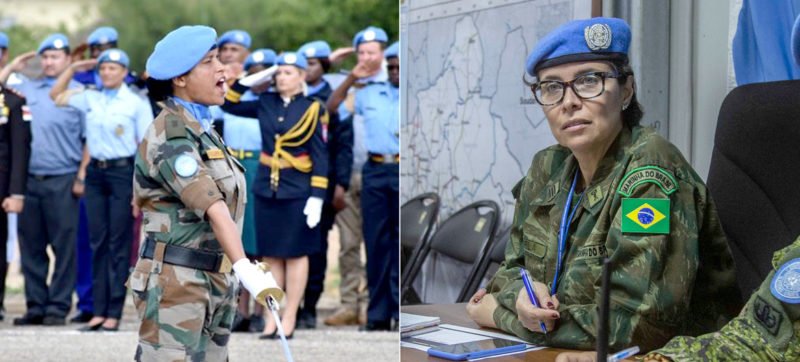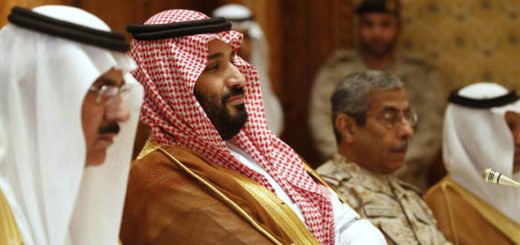Women peacekeepers from Brazil and India share UN military gender award – Why it is important?

“The men and women serving under the blue flag across the world have a duty to uphold the highest standards of integrity, professionalism and respect for the dignity of the human person.” – United Nations Secretary-General Antonio Guterres
Women besides dominating in the fields of education and healthcare are deployed in all areas, be it police or military, thus, have a positive reflection on the peacekeeping environments. They, definitely are a necessity in the process of peacekeeping, since they have better access to communities, can help in the protection of human rights, generate trust as well as confidence and are capable to encourage other women to be a part of the processes but it is unfortunate to not come across an equal percentage of men and women in the stream.
According to the statistics provided by the United Nations Peacekeeping, out of approximately 95,000 peacekeepers, women constituted only 4.7% of military contingents and 10.8% of them formed police units in the UN Peacekeeping missions in 2019. But, when we look at the positive side to it, the situation has improved in comparison to the year 1993 when only 1% of women were uniformed deployed personnel.
To recognise the efforts and the dedication of individual military peacekeepers in peacekeeping operations and in promoting The UN principles on Women, Peace and Security, the United Nations created an award, ‘UN Military Gender Advocate Award’ in the year 2016. The award is received by the peacekeepers who are nominated by the heads and force commanders of peace operations.
This year, for the first time ever, two peacekeepers – Major Suman Gawani from India and Commander Monteiro de Castro Araujo from Brazil, will receive the award jointly on the scheduled date i.e. May 29th during an online ceremony presided over by the United Nations Secretary-General on the occasion of International Day of UN Peacekeepers.
Major Suman Gawani, the first Indian peacekeeper to win the award is a Military Observer, formerly arrayed to the UN Mission in South Sudan (UNMISS). She has trained over 230 UN Military Observers on conflict-oriented sexual violence and confirmed the attendance of women military observers in each of the mission’s team sites. In addition, she supervised, the South Sudanese government forces, and assisted them to launch their action plan on conflict-related sexual violence. Her work clearly portrays her vision to integrate an all- genders- perspective in our daily work, interaction with colleagues and community.
It is a moment of pride for the Indian army as Major Gawani, hasn’t just bought a laurel to the country but has proved the credibility of the nation and its forces, increased enthusiasm and broken multifarious stereotypes that persisted in the country, for like – women are an epitome of beauty and are meant to pursue household chores, they are emotional and always require a shoulder to cry upon. Furthermore, they aren’t applicable to perform tasks that involve labour. With her achievement, families might stop declaring their daughters as ‘paraya dhan’, (an unaffordable burden, who wouldn’t contribute to the family) and, commence spending on their education. Moreover, it has given an essence of motivation the young women of the country \ to make their career in ‘non-traditional’ fields.
On the other hand, Commander Monteiro de Castro Araujo, a Brazilian peacekeeper, is a Military Gender and Protection Advisor in the UN Mission of the Central African Republic (MINUSCA). As a part of her responsibility, she has organised various training sessions on gender and protection. It was because of her sincerity that the gender-responsive patrols engaging with local communities increased from 574 to approximately 3,000 per month. She has proved that women are powerful role models and are the advocates of their own rights.

One of the greatest challenges that the UN peacekeepers are currently undergoing is the COVID-19 pandemic. The peacekeepers are continuously extending indefinite support to the governments and the local communities by shielding the vulnerable groups. Women as peacekeepers stand at the forefront of this fight too as they are playing a key role in the COVID-19 response.
To expand the role and say of women in the UN peacekeeping operation, through the UN Security Council resolution 1325 (UNSCR1325), ensuing resolutions, as well as the Action for Peacekeeping (A4P) Declaration of Shared Commitments, the UN has called for more participation of women in its operations. ‘The Global Effort’, launched by the UN Police Division is another attempt to employ female police officers into national police services and in the operations carried out by the UN police.
As per the estimates, by the year 2028, there will be a 15% increase of women in military contingents, and 25% may rise as military observers and staff officers.
It cannot be denied in any case that the UN is working hand-in-hand with its member states to increase the percentage of women involved in military and police. Promotion of women’s contribution is at the centre of the UN’s efforts, both in peacekeeping and in the societies but at the same time it disheartening to ‘NOT’ witness any statistical information/ official record that talks about the enrolment of the transgender community in the UN Peacekeeping. Henceforth, it is required for the UN to come up with the much-needed strategies to intake the transgender community in the UN Peacekeeping process, provide official records and generate awareness about the same because apart from bringing in diversity in the process it will empower, inspire and create role-models.



















